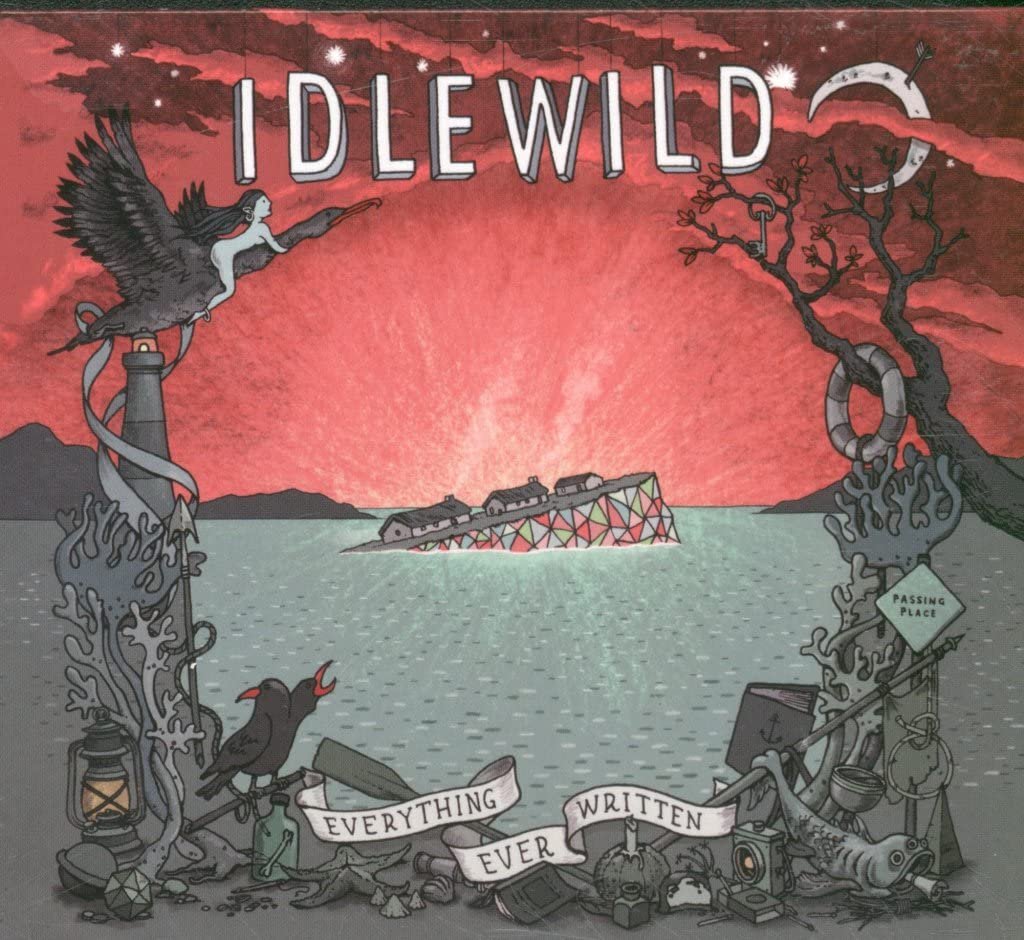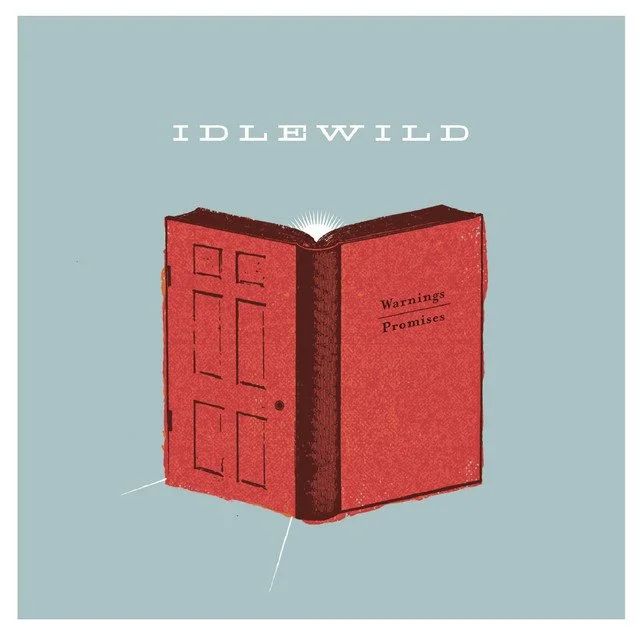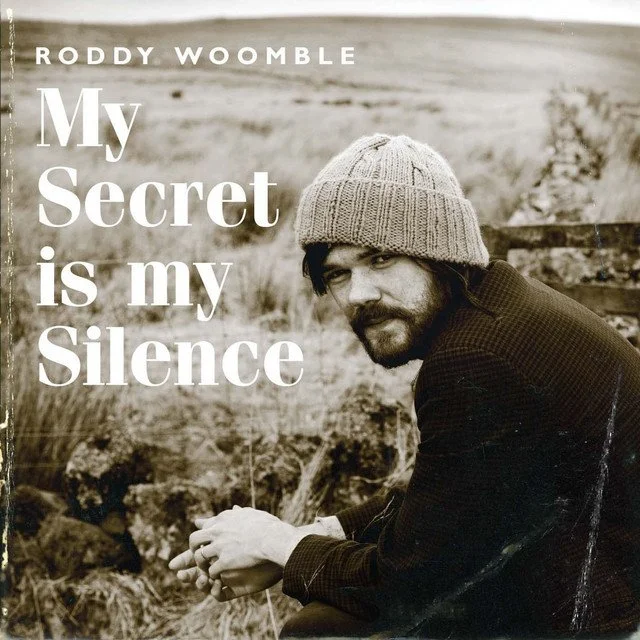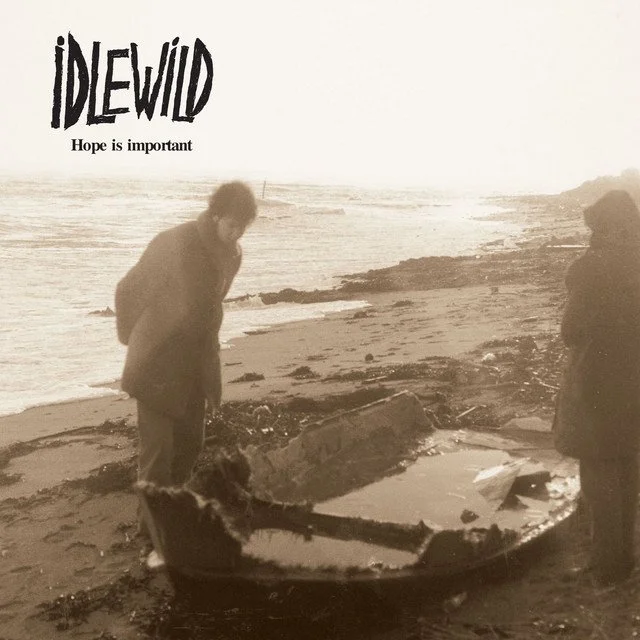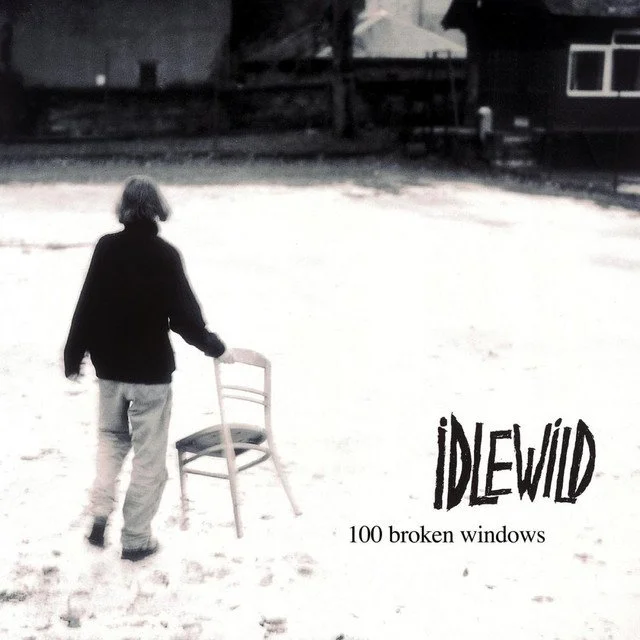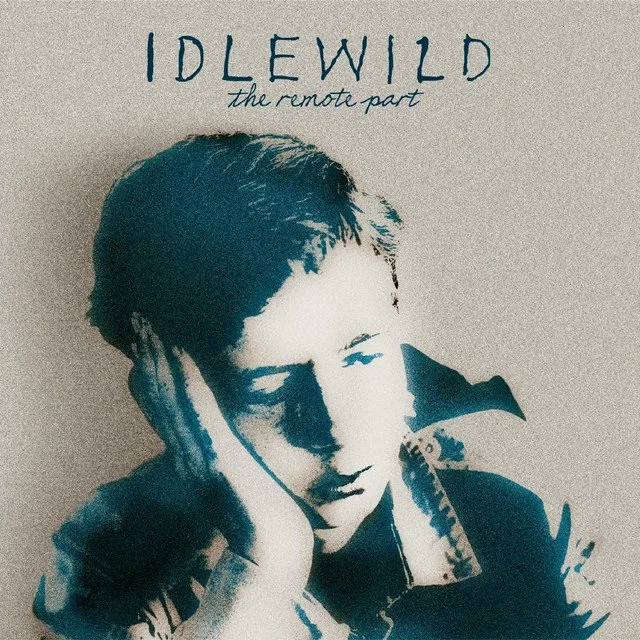Idlewild: All Albums Ranked
Scotland has a rich artistic history, and few Scottish rock bands capture the true spirit and poetry of their homeland whilst also embracing the sounds of punk, grunge and indie. Idlewild started life as a scrappy, noisy live band have evolved significantly through their 30-year career, while retaining their knack for memorable tunes and unique lyrics. What you do you think of our album ranking? Where should the new, self-titled 2025 record sit? Check out this playlist and have your say in the comments!
There are some moments on ‘Everything Ever Written’ that have a beautiful warmth to them - particularly the majestic ‘Every Little Means Trust’ and delicate piano-led closer ‘Utopia’.
Unfortunately, there are too many tracks that make little, if any mark. Idlewild in 2015 seemed more concerned with texture and harmony than producing memorable songs - a trend they continued in 2019 (albeit more effectively) with ‘Interview Music’. It means we given an abundance of lush instrumentation (‘All Things Different’, for example), but you would struggle to remember many of the songs, even after multiple plays.
‘Everything Ever Written’ also led Idlewild to lean into extended, free-form jams, away from the pressures and confines of having a hit single. While it is commendable for them to express themselves as artists, it makes for a tedious listening experience at times, such as on the 7-minute ‘Use It If You Can Use It’ which would have still been dull at half its length.
If you like the poetic folk side of Roddy Woomble’s solo work, then there may be moments on ‘Everything Ever Written’ that provide a warm comfort - but this is ultimately Idlewild’s most skippable album. They developed the ideas better on the follow-up, ‘Interview Music’.
Standout tracks: ‘Nothing I Can Do About It’, ‘Every Little Means Trust’, ‘Come on Ghost’
Idlewild’s 8th (and potentially last) record was a long time coming - partly due to Roddy Woomble’s solo career gathering pace, partly due to some further line-up changes, and partly because the band were no longer being put under the commercal pressures that had crept in during the 'Remote Part’ era of the early 00s. As such, ‘Interview Music’ is the sound of glorious experimentation and abandon.
There is a brief moment in the chorus of ‘Same Things Twice’ - a tiny crack in Roddy Woomble’s voice when he pushes the line “Rip it up” into a yelp - that immediately harks back to the glories of Idlewild’s noisy early years. It is a brilliant, brief moment. Sadly, it is short-lived, and limited to one line. But it is enough to show that Idlewild still had some affection in 2019 for their scrappy, Sonic Youth-inspired past.
Much of ‘Interview Music’ is based around free-form ideas, and it is arguably less song-based and more about having fun being creative as a band in the studio - represented well by the cover image of paint being flung around. As such, it can be an enjoyable listen if you immerse yourself in the experience and appreciate the album for what it is. On the flipside, if you aren’t in the mood then ‘Interview Music’ can - with the exception of ‘Same Things Twice’, which sticks out a mile, and the catchy ‘All These Words’ - be quite a slog.
Standout Tracks: ‘Same Things Twice’, ‘All These Words’, ‘There’s A Place For Everything’
‘The Remote Part’ had elevated Idlewild beyond cult status, and suddenly their singles were everywhere - radio, Top of the Pops and countless adverts and TV sports shows. Following extensive (and exhausting) touring, during which they had their first line-up change after Bob Fairfoull resigned from his role as bassist, Idlewild regrouped and returned with the elegant ‘Warnings/Promises’.
Roddy Woomble has been quoted saying that ‘Warnings/Promises’ is the best Idlewild album - but from an outsider’s perspective it is hard to put this record above the first 3. Not only are a few of the songs poor imitations of others (‘I Understand It’ pales in comparison to ‘Live In A Hiding Place’, for example), but the production is frustratingly flat and impenetrable at times, with lifeless drums buried beneath multi-layered guitars, especially on the louder moments such as the opening of ‘Love Steals Us From Loneliness’ and the ear-piercing squeal of ‘I Want a Warning’. The more enjoyable moments on ‘Warnings/Promises’ tend to be the slower, quieter tracks such as ‘Disconnected’, ‘Not Just Sometimes But Always’ and ‘Welcome Home’, which tallies with the narrative that Idlewild themselves (or some of the band, at least) were growing tired of the raucous sound of their early records and were more interested in pursuing a folk-rock direction.
That said, there is an undeniable quality in the two standouts, ‘El Capitan’ and ‘Love Steals Us From Loneliness’. Brickwalled sound aside, these are timeless songs.
Standout Tracks: ‘Love Steals Us From Loneliness’, ‘El Capitan’, ‘As If I Hadn’t Slept’
Not only were Idlewild in a strange place themselves in 2008/9, being without a label, but the music industry as a whole was doing its best to simply survive. File sharing had meant that CD sales were plummetting. Streaming wasn’t fully established yet. MySpace was confusing. And generally, rock music - both in the UK and USA - was in something of a wilderness period.
Idlewild jumped on the crowd-funding trend that was starting to help mid-level bands to keep going. Gathering contributions from their committed fanbase, Idlewild self-recorded ‘Post Electric Blues’, a polished, American-influenced album that took few risks but maintained a high quality of songwriting. In many ways, it was a more well-rounded record than its patchy predecessor ‘Make Another World’, even if it does play it somewhat safe.
Now a 5-piece, and with only 3 of the original members, Idlewild sounded very different in 2009 to 1999. Roddy Woomble’s voice was smoother, the instrumentation was cleaner and more proficient, and the folk influences were more pronounced. ‘Post Electric Blues’ has been largely forgotten by many, but there is still treasure to discover here - especially the beautiful harmonies of ‘The Night Will Bring You Back To Life’ and the euphoric chorus of opener ‘Younger Than America’.
Standout Tracks: ‘Younger Than America’, ‘Take Me Back To The Islands’, ‘The Night Will Bring You Back To Life’
‘Captain’ was where it all began. 4 unkempt, malnourished university students from Glasgow, Scotland, recording 6 noisy, abrasive tracks in a matter of hours.
Who needs different lyrics for the second verse, when you can just repeat the first verse again? Who needs varied orchestration when you have a distortion pedal? Who needs to play their instruments well, or in tune?
This is the charm of ‘Captain’ - and indeed anything and everything that Idlewild created in their early years (all the b-sides from this era are amazing too, most of which you can find in the ‘A Distant History’ compilation). It was wild, in your face, memorable, and utterly, utterly brilliant.
Standout tracks: ‘Self Healer’, ‘Captain’, ‘Satan Polaroid’
Idlewild were incredibly prolific in the late 90s and early 00s, producing album-quality b-sides to accompany their multitude of singles. They compiled 10 years of b-sides in 2007 in this excellent collection, ‘A Distant History’, which came out as a companion to the best-of album ‘Scottish Fiction.
It isn’t an exhaustive anthology of b-sides - there are lots of songs that didn’t make the tracklisting, including the nonsensical (yet legendary) ‘Mince Showercap’ trilogy and some of the incredible b-sides from the ‘100 Broken Windows’ sessions (which you can find on Disc 2 of that album’s reissue). As an album, it doesn’t flow particularly well - and it would benefit from a change in track order and replacing some less essential tracks (such as the live version of ‘You Don’t Have The Heart’) with better rarities from Idlewild’s masterful catalogue (‘Faster’, in particular, and the piano version of ‘Chandelier’). But even with its flaws, ‘A Distant History’ still makes for a great listen.
The record opens with the raucous ‘Queen of the Troubled Teens’, Idlewild’s debut single that predated the ‘Captain’ EP. What an intro! ‘Queen of the Troubled Teens’ is a perfect example of Idlewild’s messy, noisy beginnings, but still based around catchy hooks.
The standout is ‘Poor Thing’, which had all the potential of being a hit single during the era between ‘100 Broken Windows’ and ‘The Remote Part’. Slow, majestic and euphoric - it would be worthy of a greatest hits compilation.
Standout Tracks: ‘Queen of the Troubled Teens’, ‘Poor Thing’, ‘This is Worse’
‘Warnings / Promises’ hadn’t yielded the commercial success that the label may have hoped for, which signalled the start of a new period for Idlewild - one of insecurity and reduced budgets, but also of new creative opportunity. As such, ‘Make Another World’ felt like something of a retreat to Idlewild’s noisier, rockier past.
Instrumentally, 'Make Another World’ had more urgency than the previous couple of records, especially in tracks such as ‘In Competition For The Worst Time’, ‘Everything As It Moves’, ‘If It Takes You Home’ and the excellent ‘Ghost In The Arcade’. The folk influences from ‘Warnings / Promises’ were largely absent, and there seemed to be far more authenticity within the heavier sound.
Roddy Woomble’s vocals were considerably more restrained than in Idlewild’s early years (‘Once In Your Life’ is a great example), but his warm tone works well here. ‘Make Another World’ is somewhat one-dimensional, but it played an important part in ensuring the Idlewild’s career would be long-lasting, and it has held up surprisingly well over the years.
Standout tracks: ‘Ghost In The Arcade’, ‘No Emotion’, ‘If It Takes You Home’
Eschewing the longer-form experimentation and wider range of instruments that were used in ‘Interview Music’ and ‘Everything Ever Written’, ‘Idlewild’ has a back-to-basics vibe, bringing to mind the era between ‘The Remote Part’, ‘Warnings / Promises’ and ‘Make Another World’. Most songs sounds like they could be a single, and there are tracks here (including ‘Like I Had Before’ and ‘The Mirror Still’) that have effortlessly brilliant melodies that stand up against Idlewild’s most classic tracks. The production is stunning, leaving room for every instrument, though fans hoping for a return to the noisier clatter of ‘100 Broken Windows’ won’t find that here. There is more of an early REM, Echo & The Bunnymen and mid-period Supergrass sound to most of the record, keeping an up-tempo momentum through most songs but leaving the instrumentation sparse.
‘(I Can’t Help) Back Then You Found Me’ combines the poetic brilliance of Roddy Woomble’s solo ventures with a dreamy, yet propulsive soundscape. ‘Writers of the Present Time’ matches anything on ‘The Remote Part’ and is a future classic, evoking The Cure both sonically and in feel. Best of the bunch is opener, and lead single, ‘Stay Out Of Place’ which gets better with every listen, with a spine-tingling refrain of “I’m glad that we stayed here for a while. We were here for a while“, that single-handedly encapsulates the modest but poignant majesty of Roddy’s lyrical career.
The world is a better place with Idlewild in it, and this 2025 self-titled album gets better and better with repeated listens.
Standout Tracks: ‘Stay Out Of Place’, ‘(I Can’t Help) Back Then You Found Me’, ‘Writers of the Present Time’
Whilst it is a Roddy Woomble solo album and not an official Idlewild release, ‘My Secret Is My Silence’ is included in this ranking for three reasons:
1) It was co-written by Roddy and Rod, the 2 principle songwriters from Idlewild - and some of the tunes (e.g. ‘Under My Breath’ and ‘As Still As I Watch Your Grave’ were originally penned for a full band release).
2) It followed straight on from ‘Warnings / Promises’ and continues in a similar songwriting vein, leaning in to the traditional sounds of the Scottish Highlands.
3) It is OUTSTANDING.
‘My Secret Is My Silence’ is absolutely worthy of a spot in this list, featuring some of the very best songs of Roddy Woomble’s illustrious career. He has since released a string of other solo record, but this one (his debut) is Idlewild in all but name.
Starting with the gorgeous harmonies of ‘I Came In From The Mountain’, this album is the equivalent of a warm cup of tea while sat on a windy Scottish hill in Autumn. With contemplative lyrics that celebrate the surrounding landscape, life-affirming choruses (‘Act IV’ and ‘Waverley Steps’ in particular), and even a bouncy jig (‘Whiskyface’), ‘My Secret Is My Silence’ is a treat.
Standout Tracks: ‘As Still As I Watch Your Grave’, ‘Waverley Steps’, ‘I Came In From The Mountain’
Hot on the heels of the ‘Captain’ EP which had made them the hottest British band on Steve Lamacq’s Radio 1 Evening Session, Idlewild’s debut full-length record ‘Hope Is Important’ was scrappy, noisy and deceptively ambitious.
Idlewild’s live shows were notorious for being chaotic and raucous, and they regularly blew other bands (such as Ash) off stage. ‘Hope Is Important’ does a good job of capturing this energy, with just enough polish to make songs like ‘Paint Nothing’, ‘A Film For The Future’ and ‘I’m A Message’ radio-worthy. Most of the tracks are fast-paced, adrenaline-fueled bursts of life-affirming rock, such as the fantastic ‘Everyone Says That You’re So Fragile’, broken up by a couple of slower numbers such as ‘I’m Happy To Be Here Tonight’ which hinted at Idlewild’s future leanings.
The scrappy punk of ‘You’ve Lost Your Way’, ‘4 People Do Good’ and ‘You Don’t Have The Heart’ haven’t aged particularly well, but they retain a certain charm. It is unlikely they will ever be played live again, given that they rely on Roddy Woomble’s voice being more of the howl / bark which he abandoned in the early 00s. But if you were a teenager in the late 90s, and you jumped around in the sweaty Idlewild moshpit like a lunatic, ‘Hope Is Important’ is a glorious time capsule.
Roddy Woomble’s lyrics have become increasingly poetic and colourful throughout Idlewild’s lifetime and his own brilliant solo career - but is there a better couplet in early Idlewild than “And when I argue Sid Barrett makes me laugh. I laugh at your conversational skills…or lack of” (‘When I Argue I See Shapes’)?
Standout tracks: ‘When I Argue I See Shapes’, ‘Close The Door’, ‘I’m A Message’
It wouldn’t be unfair to view ‘100 Broken Windows’ as the album where Idlewild took all the best bits of ‘Hope Is Important’ and improved them further, but only after listening to REM’s entire back catalogue first.
Only two lines into the album, when you hear Roddy Woomble sing the word “History” it is immediately obvious that he had taken some vocal inspiration from Michael Stipe. Suddenly, the gravelly and yelpy vocal stylings of ‘Captain’ and ‘Hope Is Important’ were replaced with confident, harmonious singing with a slightly Americanised twang, over the top of punchy songs that would have been worthy of Kurt Cobain. And wow, did it work!
For many, ‘100 Broken Windows’ is the standout Idlewild record. In our opinion, it is bettered by ‘The Remote Part’s orchestration and broader sonic palette - but ‘100 Broken Windows’ is still stellar. ‘Little Discourage’, ‘Roseability’, ‘These Wooden Ideas’, ‘I Don’t Have The Map’… all of them are magnificent.
‘Rusty’, ‘Listen To What You’ve Got’ and ‘Quiet Crown’ are skippable, and could have been replaced by b-sides such as ‘There’s Glory In Your Story’ and ‘Broken Windows’ (both of which are featured on the excellent second disc that accompanied the special edition that came out in 2010). With some minor tweaks, ‘100 Broken Windows’ would be as close to perfect as British post-grunge gets.
Standout Tracks: ‘Let Me Sleep (Next To The Mirror)’, ‘Little Discourage’, ‘Actually It’s Darkness’
Kicking off with the violin-drenched rush of ‘You Held The World In Your Arms’, and ending with the poetic euphoria of the title track, ‘The Remote Part’ is an absolute masterclass in how to craft a timeless album.
The tracklisting is perfect, showcasing a more muscular and confident version of Idlewild’s heavier side (‘A Modern Way of Letting Go’ and ‘I Am What I Am Not’), alongside stunning ballads such as ‘American English’, ‘I Never Wanted’ and ‘Live in a Hiding Place’. ‘American English’ was a breakout single, and a showcase of Roddy Woomble’s increasingly confident singing voice.
What truly sets ‘The Remote Part’ in first place is the fact that there are zero skips. Where each of the other Idlewild records has one or two weaker songs, everything on ‘The Remote Part’ has its place. Even the less immediate numbers such as ‘Century After Century’ and ‘Tell Me Ten Words’ could have been hits if they had been released by Elbow, Snow Patrol, Feeder or Stereophonics.
Emotional, powerful, reflective, energetic, fun, contemplative - this album has it all.
Standout tracks: ‘(I Am) What I Am Not’, ‘American English’, ‘Out Of Routine’

